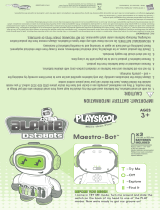Page is loading ...

BATTERIES
INCLUDED
x2
1.5V AAA or R03 size
Replace with 2 x 1.5V “AAA” or R03 size
batteries. Alkaline batteries recommended.
Phillips/cross head screwdriver (not included)
needed to replace batteries.
AGES 2+
05513
Thank you for purchasing this PLAYSKOOL® prod-
uct!
®
Construction Kit
ON THE GO
INCLUDES:
Rolling case, key with
name tag, cardboard
stop sign, fabric vest,
tape measure and
communicator.

Push in the “tape” on the tape
measure to hear fun sounds.
TO REPLACE BATTERIES
Use a Phillips/cross head screwdriver (not included) to loosen screw in battery
compartment door (screw remains attached to door). Remove door. Remove
and discard old batteries. Insert 2 fresh “AAA” or R03 size batteries. Alkaline
batteries recommended. Replace door and tighten screw.
PLAY FEATURES

CAUTION:
1. As with all small batteries, the batteries used with this toy should
be kept away from small children who still put things in their
mouths. If they are swallowed, promptly see a doctor and have the
doctor phone (202) 625-3333 collect. In other countries, have the
doctor call your local poison control center.
2. Make sure the batteries are inserted correctly and always follow the
toy and battery manufacturer’s instructions.
3. *Do not mix old and new batteries, alkaline, standard (carbon-zinc)
or rechargeable (nickel-cadmium) batteries.
!
IMPORTANT: BATTERY INFORMATION
Please retain this information for future reference.
Batteries should be replaced by an adult.
CAUTION:
1. Always follow the instructions carefully. Use only batteries specified
and be sure to insert item correctly by matching the + and – polarity
markings.
2. Do not mix old batteries and new batteries or standard (carbon-zinc) with
alkaline batteries.
3. Remove exhausted or dead batteries from the product.
4. Remove batteries if product is not to be played with for a long time.
5. Do not short circuit the supply terminals.
6. Should this product cause, or be affected by, local electrical
interference, move it away from other electrical equipment. Reset
(switching off and back on again or removing and re-inserting batteries)
!
FCC STATEMENT
This device complies with part 15 of the FCC rules. Operation is subject to the following two
conditions: (1) This device may not cause harmful interference, and (2) this device must accept
any interference received, including interference that may cause undesired operation.
This equipment has been tested and found to comply with the limits for a Class B digital
device, pursuant to Part 15 of the FCC Rules. These limits are designed to provide reasonable
protection against harmful interference in a residential installation. This equipment generates,
uses and can radiate radio frequency energy, and, if not installed and used in accordance with
the instructions, may cause harmful interference to radio communications. However, there is
no guarantee that interference will not occur in a particular installation. If this equipment does
cause harmful interference to radio or television reception, which can be determined by turning
the equipment off and on, the user is encouraged to try to correct the interference by one or
more of the following measures:
• Reorient or relocate the receiving antenna.
• Increase the separation between the equipment and the receiver.
• Consult the dealer or an experienced radio/TV technician for help.

7HRHS
7HRHS
BNLBNL
Product and colors may vary.
© 2007 Hasbro. All Rights Reserved.
TM & ® denote U.S. trademarks.
05513 P/N 6718180000
/

